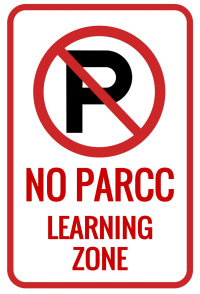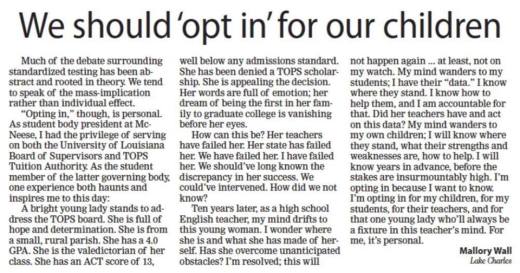The late Senator Daniel Patrick Moynihan once quipped, “Everyone is entitled to his own opinion, not his own facts.”
While White battles to keep his job, we the teachers and students are constantly held hostage to an Education Department that seems to convey the message that ineptitude is “evidence of progress.”
The Lens, a New Orleans publication, posted an article about how students’ scores won’t arrive until November. Students across Louisiana “took the exact same form as did kids across the country,” State Superintendent John White said. “Same questions. Same order. Nothing different.”
No, they did not.
Louisiana contracted with Data Recognition Corporation, while the other PARCC states contracted with PARCC. Unless DRC and PARCC colluded to make the tests the same, this did not happen.
White has stated in the Advocate that the test will show “evidence of progress.”
How? We have never given this test before, so how can we show progress? It is different in makeup and design from all previous tests. Even worse, the public has not been shown a single question on the tests to even gauge if they were written appropriately for the age levels, or answered correctly. There have been numerous errors in past tests.
These tests will supposedly give a better evaluation of our students’ performance.
How? These tests that students took in March won’t be released until November. Students have already been placed in classes this year without any knowledge of their strengths or weaknesses on state tests. Teachers have no clue what skills need more emphasis this year, or what they could have done to help students from last year.
How is this “evidence of progress”?
White and numerous BESE Board members up for re-election have been boasting about the fact that graduation rates are up under White’s leadership.
When you lower the passing score on a Geometry End-of-Course Test to a 32%, that’s not leadership. That’s malpractice.
When asked recently about being able to see exact questions on the test and precisely what skill they were meant to evaluate, White responded that such information was not available because a question can test many skills.
Then what is the point of this expensive test? A test that takes months longer to grade than the previous tests and the questions are not clearly written to evaluate specific skills?
How is this “evidence of progress”?
On Tuesday, October 13th, White will be asking the BESE Board for the authority to set the cut-off scores for the Louisiana categories (advanced, mastery, fair, good, etc.). Based on his track record of lowering EOC scores in the last few years, the public should have little confidence in the results to come.
While White battles to keep his job, we the teachers and students are constantly held hostage to an Education Department that seems to convey the message that ineptitude is “evidence of progress.”








